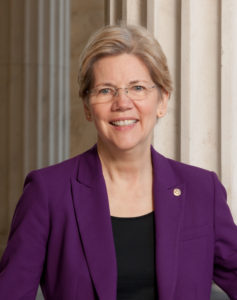I’m all for super-progressive tax systems,” he said. “I’ve paid over $10 billion in taxes. I’ve paid more than anyone in taxes. If I had to pay $20 billion, it’s fine.
“But when you say I should pay $100 billion, then I’m starting to do a little math about what I have left over,” he added. “You really want the incentive system to be there without threatening that.”
Mr. Gates is the second-richest person in the world, according to Forbes magazine, with a net worth of $106.2bn.
Well, of course, she didn’t say that, she said six percent. A little over six billion in the first year. Bill’s 64, and of course, the actual nominal amount will decrease each year unless he can grow his money faster than six percent, in which case, what’s the problem?

Elizabeth Warren
He’ll never, ever be anything less than a multi-billionaire, in other words. His bullshit about 100 billion is just that, fear-mongering bullshit.
And if he’s paid ten billion on 106 billion, well his tax rate was about ten percent. Most middle class families would love to have that low a tax rate. (Yes, I know it’s on income, not wealth, but the point is he obviously paid very low income taxes. Which, actually, is what the data shows–the middle and working classes pay a higher percentage than the rich.)
Bill, of course, is the “good” billionaire.” But he’s the guy who gave straight-up fascist Modi a reward. He’s the guy who spent millions to change the educational system in the US, then admitted that the model he successfully pushed doesn’t actually work. He’s the guy who used brutal, monopolistic practices to build Microsoft.
And he doesn’t want to pay a six percent wealth tax that will be used to provide universal healthcare.
Billionaires are bad, and, as an even more radical and willing-to-take-on-billionaires candidate, Bernie Sanders, said, they shouldn’t even exist.
As for Billy, he thinks he deserves to be one of the richest people in the world because he created the Wintel monopoly and crushed rivals with practices which were, under black-letter law, illegal.
But one can understand why he might prefer a Republican president. After all, it was George Bush, Jr. who withdrew the anti-trust suit which would have broken up Microsoft and left Bill worth a lot less than a 106 billion dollars.
Trump, of course, massively dropped tax rates on the rich.
Money comes first, ethics come second. Bill’s always understood that.
Republicans have been pretty good to Bill. Performative wokeism and his good image aren’t worth a six percent wealth tax. As for people without healthcare, welll, better they die than he pay taxes which would leave him a multi-billionaire for the rest of his life.
The results of the work I do, like this article, are free, but food isn’t, so if you value my work, please DONATE or SUBSCRIBE.
